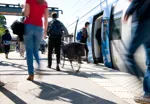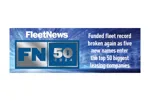Taking MPs to task over public transport and risk
In response to the interviews with MPs on workplace parking levies, congestion charging and road pricing:
During the recent snowfall and the usual chaos that follows I decided to use public transport to get to work in Oxford from my home in Swindon.
This journey normally takes 50 minutes in my company car.
The walk to the bus stop was slippery but the bus driver received my sincere thanks for making the effort to get to work.
Having not travelled by train in years, with unhappy memories of when I did, it was no surprise to be packed like cattle as it was all those years ago.
The train arrived more or less on time and after an eight minute walk through the ice rink pavements I arrived at work 1 hour and 55 minutes later and nearly £30 out of pocket.
So what incentive is there for people like me to use public transport when it takes twice and long to get to work and costs three times as much?
Bring on all the parking fees, driving fees, fees for going to work etc, petrol tax, BiK, road works, floods, snow, ice and fog because I am staying with my company car and will fight not to travel by public transport.
Roger Pilcher, posted on fleetnews.co.uk
In response to the interviews with MPs on managing at-work driver risk:
This is fleet once again being an easy target because we’re so visible, accountable and measurable.
Of course we should do whatever we can to manage accident risk. And I totally agree with keeping down red tape.
What I disagree with is the focus being put on it. If you have a problem that’s one-third caused by one group of people and two-thirds by another, which group do you focus on?
How can you say that the group that causes one-third of the problem is “at particular risk” rather than the other group?
We (both Government and fleet) need better visibility of accident statistics to make sure we’re concentrating on the correct people.
GrumpyOldMen, posted on fleetnews.co.uk
Branded cards do offer savings
The claims made by Jenny Powley, of Arval (Fleet News, February 4), have to be challenged.
She suggests that fleets using brand-specific fuel cards are ignoring an issue of route deviation and thereby losing money.
However, Arval customers have to pay pump prices, while users of other cards enjoy discounts.
She says drivers have to deviate from their routes to refuel if using branded fuel cards. Remember, these so-called ‘restricted’ fuel cards are for such networks as BP, Esso, Shell, Texaco and so on.
Even a driver who does not refuel until their warning light comes on still has several miles of fuel in the tank.
What kind of route could they be on that would not soon take them past their chosen brand of service station?
A driver carrying a Shell fuel card, for example, has access to more than 1,100 sites. There is in excess of 1,200 facilities in BP’s national network.
This “route deviation” idea is a red herring which would only make sense if the major brand’s facilities were rare.
Also, it has been common for years for drivers to carry more than one brand of fuel card.
Any fuel card supplier which will not offer discounts has to find something to attack its competitors who offer massive savings.
Steve Clarke, general manager, The Fuelcard People
Congestion charge
It was interesting to read your article on the Congestion Charge apology in the February 4 issue.
All of the problems highlighted have been experienced by us and are still ongoing, resulting in a lot of extra administration work.
I lodged a formal complaint on the CC website on February 3, but have not had a response yet.
The situation is utterly ridiculous and yet we are unable to take our account elsewhere. It would be a nice gesture if Transport for London were to apologise to companies affected.
Sarah Medcalf, Guideline Lift Services















Login to comment
Comments
No comments have been made yet.